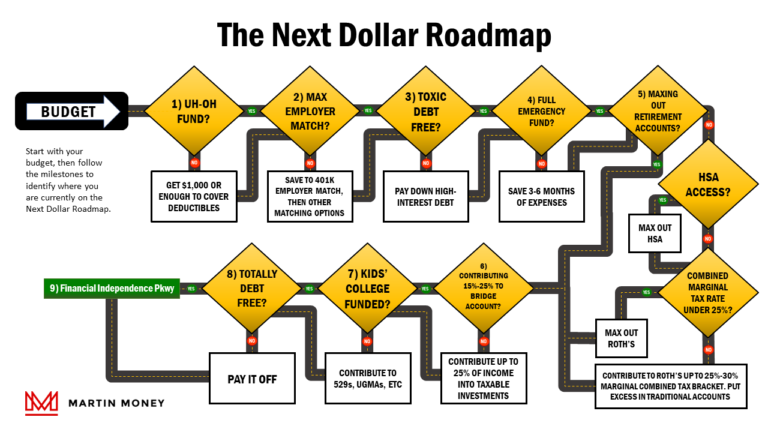You Need a Financial Plan
You’ve probably heard it said that failing to plan is planning to fail. This maxim is absolutely true when it comes to money.
Just like you can’t expect to drive somewhere you’ve never been without your trusty GPS, you simply can’t expect to arrive at your financial goals without a plan on how you’re going to get there.
But aren’t financial plans for rich people? Well, yes, yes they are. But they’re also for the middle class, lower class, and any other class of people that use money.
After all, you can’t get to your first million without getting to that first $100k, and you can’t reach that without your first $10,000, and so on.
“The idea that financial planning and wealth management are just for millionaires is one of the biggest misconceptions among Americans, and one of the most damaging. Whether people think they don’t have enough money, believe it would be too expensive, or just find the whole concept too complicated, the longer they wait, the harder it is to achieve long-term success.”
- Joe Vietri - Former Charles Schwab SVP Tweet
Not only that, as you’ll see below, having a written financial plan leads to emotional, social, and health benefits in addition to obvious financial gains. Below, we’ll walk through seven noteworthy benefits of having a written financial plan.
1) A written financial plan forces you to think about your goals
The first step in assembling a financial plan is to set goals.
Goals provide us with a sense of direction and purpose. Financial goals provide us with something to reach for and justify our pursuit of wealth.
But don’t confuse nebulous ideas with thoughtfully established goals. As Antoine de Saint-Exupéry said, “A goal without a plan is just a wish.”
Perhaps you’ve heard that goals should be S.M.A.R.T. This little acronym is a very clever way to guide you through the process of creating your own financial goals.
SPECIFIC
This is the who, what, when, where, and why of goal setting.
Who is included? What am I trying to achieve? Where are the necessary resources going to come from? Why is this a worthy goal?
Don’t be afraid to go into a significant level of detail here, but not so much that you get stuck with analysis paralysis.
Your goals will probably need to be reevaluated and tweaked from time to time anyway.
MEASURABLE
Obviously, you’ll want to know how much you’re trying to save, invest, or in the case of debt; pay off.
But measurables like income, cash flow changes, large expenses, rate of return, and others can also be of material importance when establishing your goals.
Take time to carefully consider the metrics you’ll need to watch to make sure you’re on track.
ACHIEVABLE
Your goals need to be possible to reach. There are few things that kill motivation faster than a task that is so big you have trouble comprehending it.
For example, maybe your goal is to pay off $20,000 in student loan debt this year.
If you only have a few hundred dollars left at the end of each month’s bills, this probably isn’t an achievable goal for you.
Setting a lower, more achievable pay-off amount of say $3000 is a better way to go.
Challenging yourself a bit is fine, but only if you can see a reasonable path to obtaining success.
REALISTIC
A realistic goal makes sense based on your current situation. One of my life goals is to hike some of the Inca Trail in Peru.
However, with two kids at home and a long list of parental responsibilities, this isn’t a realistic goal for me right now. (But I’m keeping it firmly in the dream bucket.)
It doesn’t make a lot of sense to expend mental energy thinking of goals that you can’t possibly realize reasonably soon.
TIMELY
So here is the “when” of goal setting. Putting a timeline on your goal does a couple of things.
First, it provides some urgency. With a clear completion date in mind, you don’t have the option of procrastinating.
You need to begin working on your goal right away.
Second, it provides an opportunity to divide your goal into smaller milestones so you can calibrate your efforts.
Using the student loan example from above, if your goal is to pay off $3000 in 12 months, you know you should be putting around $300/month toward the debt.
You can quickly identify if you’re on pace each month. This allows you to either lighten up or tighten up depending on how well you’re progressing.
Remember also that finances are just a tool to reach your goals. If you make money the absolute goal you’ll find the result to be pretty empty and disappointing.
Instead, use your dreams to inform your goals. For example, instead of saying, “I want X dollars in my 401k by 60”, a better goal may be a desire to retire by 55. Or maybe you want to buy a mountain retreat or travel the globe?
Regardless of what you choose, attaching an image to the goal instead of a number provides you with more motivation to achieve it and a greater sense of satisfaction when you do.
2) A written financial plan brings peace of mind
It seems understandable that those with a plan would enjoy a more positive financial outlook than those who are just sort of “winging it”.
In fact, people with financial plans are almost three times more likely to feel a high degree of confidence they’ll actually reach their goals!
A 2020 Citizens Bank Wealth Management survey showed that 75% of savers with a written financial plan have a positive outlook on their financial well-being and 87% achieve a “high” level of confidence in their financial future.
3) A written financial plan can expose financial risks or vulnerabilities previously unnoticed
A recent update to my financial plan revealed a gap my wife and I had in the amount of life insurance coverage we had.
Since the policy was first issued we’ve moved to a larger home with a bigger mortgage. Our salaries had also increased requiring a larger payout to replace that income if one of us died.
Just going through the process of creating your own financial plan will force you to answer similar questions.
When do I want to retire? How much do we need to save for college? If a job loss occurs, how much cash do I need to ride out a period without an income?
Finding oversights like these will create a sense of relief that you caught them before it was too late to correct or mitigate the issue.
4) A written financial plan makes money decisions easier
By having a written financial plan, you can more efficiently cut through the clutter of money decisions and decide whether or not something is right for you.
Let’s say a friend wants you to invest in real estate with her, but you have a goal to boost your own savings rate first. Since these opportunities are likely to compete against each other, you’d probably have to choose one or the other.
By having a plan you can quickly explain to your friend why it’s just not the right time for you.
On the other hand, if your friend wants to tell you about a high-interest savings account at her bank or credit union, you know it might be worth looking into since it aligns with your current goal of saving more.
Your life is full of these choices. Your financial plan is a great decision-making tool to help you navigate them instead of burdening yourself with unnecessary anxiety over making a poor choice.
5) A written financial plan is a great motivation tool
By writing out your financial plan you inherently eliminate most excuses to ignore your finances. You get to establish the goals. You establish the timelines. You set the pace. If it fails now, chances are you’ll have no one to blame but yourself.
Also, hashing out your plan allows you to see what’s possible. At times we can develop a pessimistic point of view that’s based completely on our perceptions rather than solid math.
When you walk through developing your financial plan you might be surprised to find out how well you’re doing and might even discover you can accomplish things you previously thought were out of reach.
6) A written financial plan provides milestones to measure progress or change strategies
I once had a boss that was fond of saying “what gets measured, gets done.”
He repeated it enough at the time that I grew tired of hearing it, but he had a point.
It’s human nature to want status reports on our progress when reaching for a goal or trying to complete a project.
Your written financial plan will provide an abundance of ways for you to track your progress. It also gives you a chance to evaluate any adjustments you can or can’t afford to make.
This is especially beneficial when life changes occur and you’re forced to adjust. Maybe you’ve experienced a job change, bought a home, or children have entered the picture.
These events all require attention, but your measurables will give you the input you need to calibrate your plan for smoother transitions.
7) Perhaps most importantly, a written financial plan provides a higher likelihood of success
That’s right. Just by writing out your financial plan, you increase your chances of financial success. Studies show that 52% of American households with written plans save 10% or more of their income.
Only 36% of households without written plans can make the same claim. In fact, households without a plan commonly only save 1%-5% of their income or don’t save at all.
I can already hear some of you grumbling about which came first, the plan or the success. Does it really matter? If a plan makes you successful it’s obviously worthwhile.
And if successful people have plans, shouldn’t we imitate their behaviors anyway? Don’t overthink this, just start working on it!
But what’s a financial plan anyway?
Now that we’ve presented the case for why you should have a financial plan, let’s talk a bit about what goes into your plan and where to get one.
If you think of your financial life journey as a road trip, you begin planning with a starting point and the desired destination. A financial plan is an ideal route you’d take to get there.
Personally, I’ve never paid to have a formal financial plan done for me, but that’s certainly a route you can take. If you’re too busy or uninterested to do the work yourself paying a professional to generate one for you might make a lot of sense.
If you’re a do-it-yourselfer or just don’t want to invest in a paid-for plan, take some comfort in knowing that it doesn’t have to be incredibly complex.
You can generate a financial plan in a couple of hours by hand or using software that’s probably already on your computer.
Look for our posting soon about the components you need to create your own financial plan. In the meantime, check out our Next Dollar Roadmap for more ideas about creating your own financial plan.







